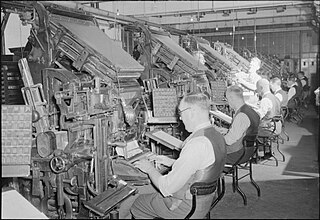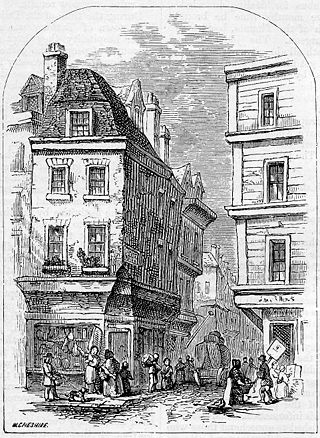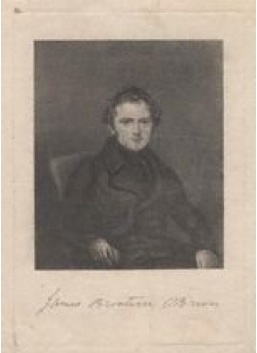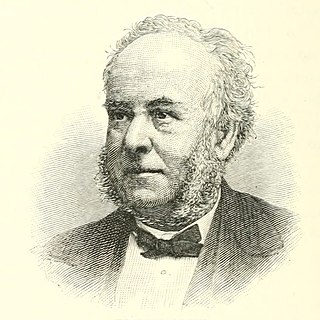Related Research Articles

The history of British newspapers dates to the 17th century with the emergence of regular publications covering news and gossip. The relaxation of government censorship in the late 17th century led to a rise in publications, which in turn led to an increase in regulation throughout the 18th century. The Times began publication in 1785 and became the leading newspaper of the early 19th century, before the lifting of taxes on newspapers and technological innovations led to a boom in newspaper publishing in the late 19th century. Mass education and increasing affluence led to new papers such as the Daily Mail emerging at the end of the 19th century, aimed at lower middle-class readers.
A stamp act is any legislation that requires a tax to be paid on the transfer of certain documents. Those who pay the tax receive an official stamp on their documents, making them legal documents. A variety of products have been covered by stamp acts including playing cards, dice, patent medicines, cheques, mortgages, contracts, marriage licenses and newspapers. The items may have to be physically stamped at approved government offices following payment of the duty, although methods involving annual payment of a fixed sum or purchase of adhesive stamps are more practical and common.

Until the early 19th century, Grub Street was a street close to London's impoverished Moorfields district that ran from Fore Street east of St Giles-without-Cripplegate north to Chiswell Street. It was pierced along its length with narrow entrances to alleys and courts, many of which retained the names of early signboards. Its bohemian society was set amidst the impoverished neighbourhood's low-rent dosshouses, brothels and coffeehouses.

James Bronterre O'Brien was an Irish Chartist leader, reformer and journalist.

Henry Hetherington was an English printer, bookseller, publisher and newspaper proprietor who campaigned for social justice, a free press, universal suffrage and religious freethought. Together with his close associates, William Lovett, John Cleave and James Watson, he was a leading member of numerous co-operative and radical groups, including the Owenite British Association for the Promotion of Co-operative Knowledge, the National Union of the Working Classes and the London Working Men's Association. As proprietor of The Poor Man's Guardian he played a major role in the "War of the Unstamped" and was imprisoned three times for refusing to pay newspaper stamp duty. He was a leader of the "moral force" wing of the Chartist movement and a supporter of pro-democracy movements in other countries. His name is included on the Reformers' Memorial in Kensal Green Cemetery.

The Northern Star and Leeds General Advertiser was a chartist newspaper published in Britain between 1837 and 1852, and best known for advancing the reform issues articulated by proprietor Feargus O'Connor.

Hector Alastair Hetherington was a British journalist, newspaper editor and academic. For nearly twenty years he was the editor of The Guardian, and is regarded as one of the leading editors of the second half of the twentieth century.
The Swindon Advertiser is a daily tabloid newspaper, published in Swindon. The newspaper was founded in 1854, and had an audited average daily circulation at the end of 2017 of 8,828.
John Cleave was a British, London based Chartist leader, a printer and newspaper publisher.
The Birmingham Journal was a weekly newspaper published in Birmingham, England, between 1825 and 1869.
The Leeds Mercury was a newspaper published in Leeds, West Yorkshire, England. It was published from 1718 to 1755 and again from 1767. Initially it consisted of 12 pages and cost three halfpennies. In 1794 it had a circulation of about 3,000 copies, and in 1797 the cost rose to sixpence because of increased stamp duty. It appeared weekly until 1855, then three times a week until 1861 when stamp duty was abolished and it became a daily paper costing one penny.

Lloyd's Weekly Newspaper, called the Sunday News after 1924, was an early Sunday newspaper in the United Kingdom, launched in 1842., ceased publication in 1931.

Edward Lloyd was a British London-based publisher. His early output of serialised fiction brought Sweeney Todd, Varney the Vampire, and many romantic heroes to a new public – those without reading material that they could both afford to buy and enjoy reading. His hugely popular penny dreadful serials earned him the means to move into newspapers.
The Braintree Instructions was a document sent on September 24, 1765 by the town meeting of Braintree, Massachusetts to the town's representative at the Massachusetts General Court, or legislature, which instructed the representative to oppose the Stamp Act, a tax regime which had recently been adopted by the British Parliament in London. The document is significant because, following the Virginia Resolves, it was among the earliest in British America to officially reject the authority of Parliament over the colonies in North America. The instructions were written by John Adams, who would ten years later become a key figure in the American Revolution and ultimately be elected the second President of the United States in 1796.
The Manchester Gazette was a conformist non-Tory newspaper based in Manchester, England.

The Stamp Act of 1712 was an act passed in the Kingdom of Great Britain on 1 August 1712 to create a new tax on publishers, particularly of newspapers. Newspapers were subjected to tax and price increased. The stamp tax was a tax on each newspaper and thus hit cheaper papers and popular readership harder than wealthy consumers. It was increased in 1797, reduced in 1836 and was finally ended in 1855, thus allowing a cheap press. It was enforced until its repeal in 1855. The initial assessed rate of tax was one penny per whole newspaper sheet, a halfpenny for a half sheet, and one shilling per advertisement contained within. The act had a potentially chilling effect on publishers; Jonathan Swift was a frequent publisher of newspapers, and complained in a letter about the new tax. Other than newspapers, it required that all pamphlets, legal documents, commercial bills, advertisements, and other papers issued the tax. The tax is blamed for the decline of English literature critical of the government during the period, notably with The Spectator ending the same year of the tax's enactment. It would see increasingly greater taxes and wider spectrum of materials affected until its repeal in 1855.
Richard Moore (1810–1878) was an English radical politician. He was a moderate Chartist, and heavily involved in the campaign against "taxes on knowledge".
The history of journalism in the United Kingdom includes the gathering and transmitting of news, spans the growth of technology and trade, marked by the advent of specialised techniques for gathering and disseminating information on a regular basis. In the analysis of historians, it involves the steady increase of the scope of news available to us and the speed with which it is transmitted.

Taxes on knowledge was a slogan defining an extended British campaign against duties and taxes on newspapers, their advertising content, and the paper they were printed on. The paper tax was early identified as an issue: "A tax upon Paper, is a tax upon Knowledge" is a saying attributed to Alexander Adam (1741–1809), a Scottish headmaster.

Early American publishers and printers played a central role in the social, religious, political and commercial developments in colonial America, before, during, and after the American Revolution. Printing and publishing in the 17th and 18th centuries among the Thirteen Colonies of British North America first emerged as a result of religious enthusiasm and over the scarcity and subsequent great demand for bibles and other religious literature. By the mid-18th century, printing took on new proportions with the newspapers that began to emerge, most notably in Boston. When the British Crown began imposing new taxes, many of these newspapers became highly critical and outspoken about the British colonial government, which was widely considered unfair among the colonists.
References
- ↑ Asa Briggs,Chartist Studies (Macmillan, 1959)